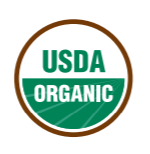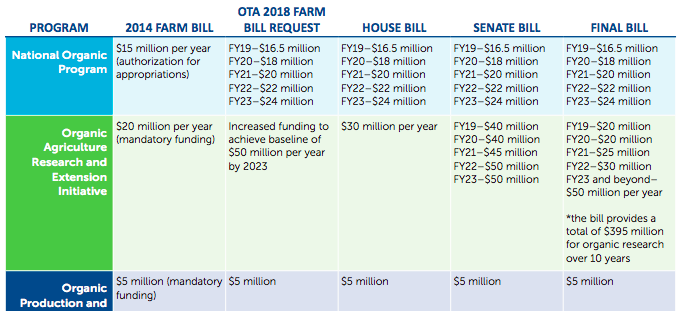The 2018 Farm Bill, which includes historic policy wins for organic, has been signed into law. Read our full statement.
Check out Organic Trade Association's side-by-side chart showing how our priorities advanced in the final 2018 Farm Bill.
DOWNLOAD FULL CHART
The Organic Trade Association’s Farm Bill platform [detailed below] calls for full support and adequate funding for the USDA National Organic Program (NOP) to keep pace with industry growth, set uniform standards, and carry out compliance and enforcement actions in the U.S. and abroad. It advocates for organic-focused research, risk management tools, data collection and direct dialog between industry and USDA that are critical to organic farmers’ success. It calls for improved access to land and capital, investment in distribution systems and infrastructure, and targeted technical assistance through the utilization of existing USDA conservation, rural development, and other programs to encourage transition to organic.
Healthy Markets | Successful Organic Farmers | Expanding the Production Base
More than 500 organic operations, from organic fruit and vegetable growers, grains and oilseed farmers, livestock and poultry producers, dairy farmers, organic processors, and food makers across 45 states, participated in a comprehensive farm bill survey conducted by the Organic Trade Association. They all agreed that the next farm bill must include policies that promote a healthy organic marketplace, ensure that organic farmers continue to be successful, and expand organic production.
POLICY PRIORITIES
- The National Organic Program
- Research
- Trade Oversight and Promotion
- Risk Management
- Conservation
- Rural Development
I. Healthy Markets
Organic is a voluntary regulatory program that depends upon a clear market distinction backed by a trusted, verified and enforced claim. The next farm bill must include support and adequate funding for the USDA National Organic Program (NOP) to keep pace with industry growth, set uniform standards, and carry out compliance and enforcement actions in the U.S. and abroad.
 The National Organic Program (NOP) and Trade Oversight
The National Organic Program (NOP) and Trade Oversight
While all domestic and imported organic products must meet USDA’s strict standards, a greater emphasis on authority and capacity to conduct investigations will keep organic markets strong. Investments in technology and access to data to improve tracking of international organic trade will provide the necessary information to ensure a transparent marketplace.
- Authorize funding for NOP to keep pace with organic industry growth.
- 10% increase, each year over the life of the farm bill, above the $15 million per year authorization in the 2014 Farm Bill.
- One-time mandatory funding of $5 million for technology systems upgrades to modernize and improve international trade tracking systems and data collection.
- Eliminate paper documents and move to electronic import certificates to ensure full traceability without hindering trade.
- Ensure effective oversight, robust investigations and enforcement across the entire supply chain.
- Limit the types of operations excluded from certification and require electronic import documentation
- Establish mechanisms for collaborative investigations and enforcement including: Government to Government working groups under equivalence arrangements, joint working groups between certifiers, NOP, and/ or State Organic Programs and require increased documentation under specific areas of concern.
- Increase accreditation authority for NOP over certifying agents and their global operations to require full accreditation audits of satellite offices.
- o Ensure coordination and access to available data cross border documentation systems administered across other agencies including the U.S. Customs and Border Protection (CBP)’s Automated Commercial Environment (ACE) and Animal and Plant Health Inspection Service (APHIS) phytosanitary certificates.
- Require USDA to complete an annual compliance report to Congress on domestic and overseas investigations and actions taken.
- Support H.R. 3871, The Organic Farmer and Consumer Protection Act of 2017 introduced by Rep. Faso (R-NY), Rep. Lujan Grisham (D-NM), Rep. Davis (R-IL), Rep. Blunt-Rochester (D-DE), Rep. Grothman (R-WI) and Rep. Soto (D-FL).
- Included in H.R. 2 , Agriculture and Nutrition Act of 2018 (House Farm Bill)
- Support S. 2927, The Organic Farmer and Consumer Protection Act of 2018 introduced by Sen. Baldwin (D-WI) and Sen. Tester (D-MT).
- Support H.R. 3871, The Organic Farmer and Consumer Protection Act of 2017 introduced by Rep. Faso (R-NY), Rep. Lujan Grisham (D-NM), Rep. Davis (R-IL), Rep. Blunt-Rochester (D-DE), Rep. Grothman (R-WI) and Rep. Soto (D-FL).
 Export Promotion
Export Promotion
U.S. organic exports are up 60%, creating jobs in the U.S. and driving demand overseas. Expansion of the Market Access Program (MAP) will create new opportunities for U.S. farmers, especially when targeted to emerging growth sectors. In 2016, nearly $1 million in MAP funds were invested in the organic sector, which led to over $48 million in projected overseas sales opportunities for U.S. organic operations – a remarkable return on investment of over 5000%!
- Support H.R. 2321 and S. 1839, the Cultivating Revitalization by Expanding American Agricultural Trade and Exports (CREAATE) Act introduced by Rep. Newhouse (R-WA) and Rep. Pingree (D-ME) and Sen. King (R-ME), Sen. Donnelly (D-IN), Sen. Ernst (R-IA), and Sen. Collins (R-ME) that includes increased funding for MAP and the Foreign Market Development Program (FMDP).
Industry Driven Standard
- The USDA organic program is a public-private partnership. When drafting the farm bill, Congress should avoid adjudicating specific standards questions and allow the standards to continue to be driven by the industry. An essential institution in this process is the National Organic Standards Board (NOSB). The NOSB ensures organic farmers, handlers, retailers, certifiers, scientists, and those that consume organic products inform the development and application of the standards.
II. Successful Organic Farmers
Accessing the opportunities provided in organic farming requires equal and comparable access to USDA programs that provide invaluable support to U.S. agriculture. Organic focused research, risk management tools, data collection and direct dialog between industry and USDA are critical to organic farmers’ success.
 Research
Research
Robust and stable funding for federal research on organic production methods and organic ingredients, pest control, and weed management is critical to the survival of organic farms.
- Increased support for the flagship Organic Agriculture Research and Extension Initiative (OREI) program to $50 million by 2023 will ensure that organic farmers can continue to meet the unique challenges they face. Support H.R. 2436 and S. 2404, The Organic Agriculture Research Act introduced by Rep. Pingree (D-ME) and Rep. Newhouse (R-WA), and Sen. Casey (D-PA) and Sen. Collins (R-ME).
Risk Management
Organic farmers need USDA to continue making improvements in the farm safety net in order to achieve appropriate risk management tools for organic farms. Congress should direct the Risk Management Agency (RMA) to prioritize development of additional organic price elections for crop insurance coverage, and review policies that cap Contract Price Addendums at two-times the conventional price election for any specific crop.
- Continue Whole-Farm Revenue Protection established in the 2014 Farm Bill and recognize the change in farm revenue after a farm has transitioned to organic. Eliminate the 30% cap on increased production value under the expansion provision.
- Congress should direct the Farm Service Agency to develop organic price elections for storage loans offered. Producers will then have the ability to access working capital based on the actual value of their crops to cash flow their operations.
- Utilize existing data developed by RMA to establish storage loan prices.
- Congress should direct RMA to consider organic farming practices when developing the “good farming practices guide” and ensure that organic producers’ ability to obtain crop insurance is not negatively impacted.
Organic Data Initiative
The Organic Production Market and Data Initiatives (ODI) is USDA’s flagship organic data collection initiative that collects information vital to maintaining stable markets, creating risk management tools, tracking production trends, and increasing exports. The organic industry cannot continue to thrive and maintain stable markets without good data collection.
- Congress should maintain the same level of program funding from the 2014 Farm Bill by providing mandatory funding of $5 million over the life of the 2018 farm bill and an additional authorization of appropriations of $5 million per-year.
Stakeholder Advisory Capacity
Direct engagement by USDA with organic producers and handlers is critical to success of organic as an important part of the diverse U.S. agricultural economy.
- Congress should establish a new federal [USDA] advisory committee for certified organic farmers, ranchers and handlers to advise the Secretary on organic farm policies and issues outside of organic standards (which fall in the NOSB’s advisory capacity).
III. Expanding the Production Base
“Organic hotspots” kick start rural economies. Clusters of counties with high levels of organic agricultural activity boost median household income by an average of $2,000 countywide. Expanding organic production brings proven economic benefits to rural communities across the U.S.
The next farm bill should facilitate transitioning to organic with improved access to land and capital, investment in distribution systems and infrastructure, and targeted technical assistance. This can be accomplished by utilizing existing USDA conservation, rural development, and other programs to encourage organic transition in a way that does not distort markets but rather facilitates producer and handler choice in response to market signals.
Rural Development
The next farm bill should focus on access to capital, infrastructure, technical expertise, and market connections between buyers and sellers.
- Congress should encourage organic’s eligibility within the following rural development programs:
- Rural business development grants
- Locally and regionally produced agricultural food products
- Value-added agricultural product market development grants
- Support H.R. 4671, Organic Farmers Access Act introduced by Rep. Duffy (R-WI) and Rep. Welch (D-VT).
Credit
Opportunities exist for expanding organic production by focusing on access to credit, capital, and loans especially during the critical transition period.
- Congress should include organic’s eligibility in:
- Valuation of local and regional crops
- Definition of qualified beginning farmer and rancher rural business development grants
Conservation Programs
Organic practices strongly align with approved practices within conservation incentive programs generally. Organic producers utilize and rate strongly Environmental Quality Incentives Programs (EQIP) and the Organic Initiative (OI) within EQIP.
- Congress should maintain and support EQIP OI.
- Congress should direct USDA to recognize required organic practices within the full suite of conservation programs including the Conservation Stewardship Program (CSP) and expand CSP organic bundles to transitioning organic farmers. CSP transition bundles will assist farmers with implementing organic practices, provide technical assistance during the transition period, and offset the financial costs of transitioning.
Certification Cost Share
The National Organic Certification Cost Share program is important to transitioning farmers and to attracting new, young farmers to organic. Farms can receive up to $750 each year (75% of the certification fee) to help defray the annual costs of organic certification. The next farm bill should maintain funding and allow for maximum flexibility in administering the program.
DOWNLOAD
2018 Farm Bill Summary and Implementation 9.12 Industry Sign-on letter on Research Funding
OTA Farm Bill Priorities
OTA Farm Bill Summary - Chart Increase Trade Oversight Protect the National Organic Standards Board (NOSB) Invest in Organic Agriculture Research Other Farm Bill Priorities - Fact Sheet
NOSB-specific Resources
Industry Letter regarding protecting the role of NOSB
House-specific Farm Bill Resources
Read Organic Trade Association's 4/18/18 statement on the House Farm Bill
Senate-specific Farm Bill Resources
Read Organic Trade Association's statement on the Senate Farm Bill Senate Ag Committee Hearing July 2017

